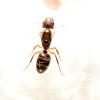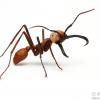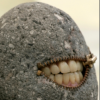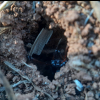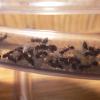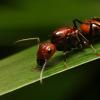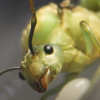The time is nearing, and I need your help! I am a large ant fan, but every year I catch ants they all lay thier eggs and then the workers come, then accept none of the food I offer? Can I please get some help? I am considering buying the ants canada guide, but I am not sure becuase I am sure I can get help from this great forum! Anyways, let me walk you through what I do so hopefully you can catch my flaws before I end the lives of the colonies I attempt to catch and raise this year... So step one, I go and collect the ants. I walk around in a park and check logs walk the ground and catch the queens into plastic jars into a special carrier I made to fit into a backpack comfortably. Then I go home and prepare the test tubes, I have about 20 of them, and I usually catch 10 queens. I fill the water about 1/2 through and then put the queen in and cap it with cotton. I put a black construction paper cover over them into a test tuber holder and leave it there for 3 days at a time glancing to make sure it is all okay. If mold is present I attach it to another one and they will move eventually, them being healthy at this time. Eventually the workers arrive and Ill present them with honey off a toothpick and either a dead small cricket, or a small piece of a super worm. This is where I do not know what I am doing. They just refuse food forever, survive until winter, then die during winter. I have them stored in a location that is non fluctuating in temperature. No one sells in Nebraska either, so I do not know what to resort to. HELP ME PLEASE!
- Formiculture.com
- Forums
- Gallery
- Members
- Member Map
- Chat




